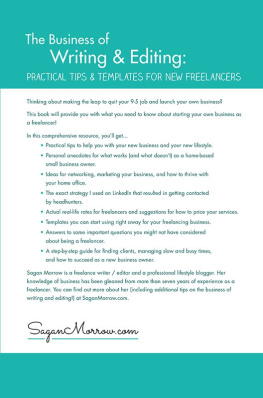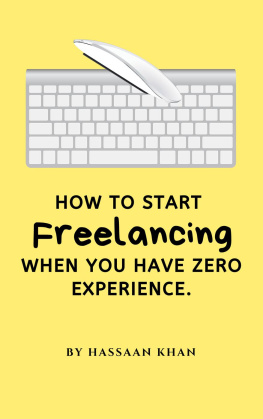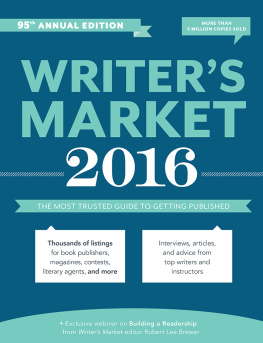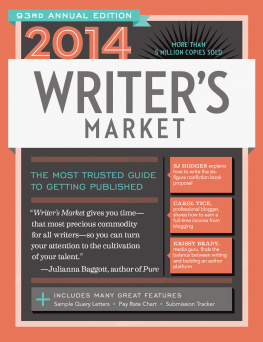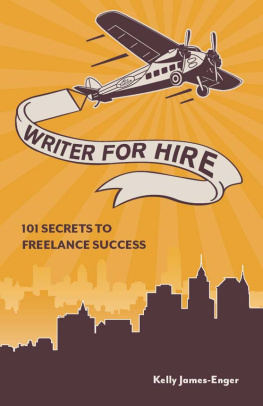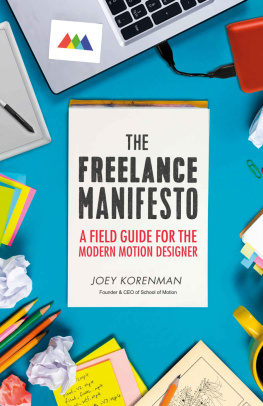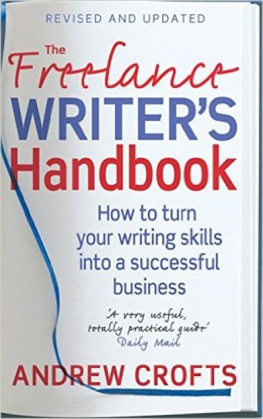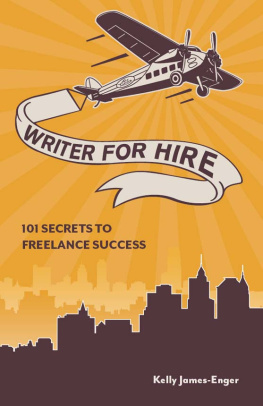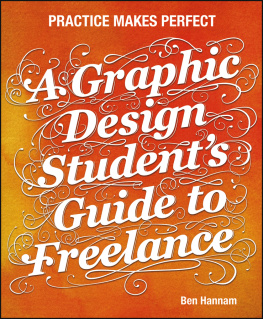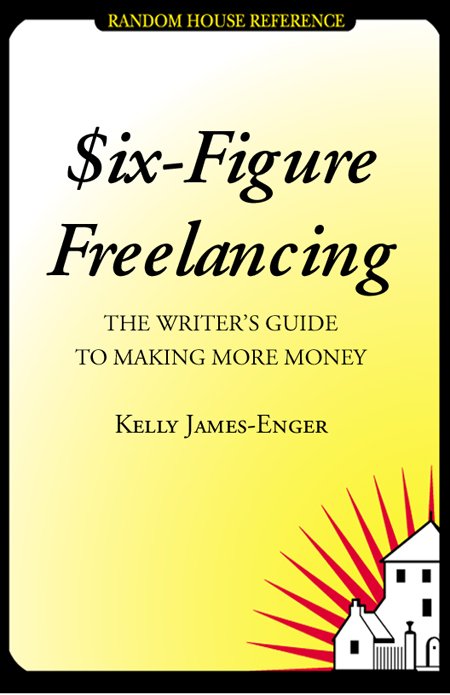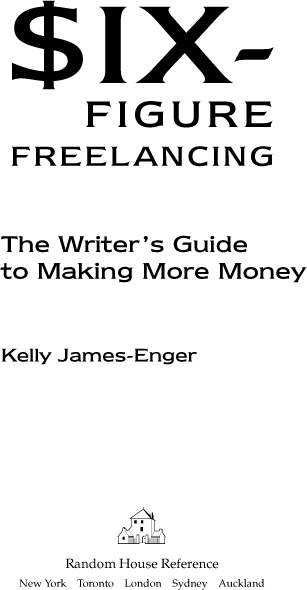Freelancers may work alone, but if they're lucky, they have a number of people supporting them behind the scenes. I thank my agent, Laurie Harper, and my editor, Jena Pincott, both of whom helped bring this book into existence.
Thanks also to my fellow six-figure freelancers who graciously gave me their time and enriched this book with their experiences, advice, and strategies: Beverly Bachel, Peter Bowerman, Andrea King Collier, Lisa Collier Cool, Sondra Forsyth, Karen Frankel, Sam Greengard, Tim Harper, Leah Ingram, Jennifer Lawler, Margaret Littman, Robert McGarvey, Victoria Moran, Jim Morrison, Brian O'Connell, Jennifer Pirtle, Erik Sherman, Jim Thornton, Sarah Wernick, and Terry Whalin. Thanks also to freelancers/tax experts Joe Anthony and Julian Block for the insights they shared that appear in chapter 5.
My sincere appreciation to the wonderful staff at the Downers Grove Public Library, who have made my job easier dozens of times, and to my friends and family, especially Cindy, Abby, my parents, Andrew, Mark, and my Solid Gold Sister, Steph. And finally, thanks to Erik, who was here at the beginning of my freelance career and to whom I owe much of my professional success, as well as my happiness. I couldn't have done itand couldn't do itwithout you.
Introduction
Last year I was asked to speak on a panel on six-figure freelancing at the 2004 American Society of Journalists and Authors Writers Conference. I agreed, and then discovered I had a mere twelve minutes to compress more than six years' of full-time writing experience into simple, practical tips that attendees could use in their own writing careers to work more efficientlyand more lucratively. How could I possibly cram everything into my speech? Fortunately, I realized that the strategies I had employed over the years to grow my business from $17,000 my first year to more than $100,000 my sixth came down to three simple ideas: having a business mind-set, working as efficiently as possible, and making and sustaining all-important connections with editors, clients, experts, agents, and other writers.
Mind-set. Efficiency. Connections. That's how I've built my freelance business. I started with no journalism background, no connections in the publishing world, and no experience. I learned along the way and began employing strategies that help me maximize my time and fatten my wallet in the meantime. When I began teaching writing classes and speaking at writers' conferences throughout the country, I discovered that many freelancers were unaware of these kinds of techniques. They knew plenty about how to write, how to overcome writer's anxiety, and maybe even how to pitch their work. But they didn't grasp the importance of taking a businesslike approach to their writing, identifying ways that they could produce more work in less time, and creating and maintaining relationships with clients and colleagues.
That's why I wrote this book. I know what it takes to start and operate a successful freelancing business, and in the pages that follow, you'll learn the secrets I and other writers have had to figure out the hard way. Take your writing business from so-so to six-figure by employing the mind-set, efficiency, and connections strategies set forth in the pages that follow.
CHAPTER 1
You're in Business Now,
Baby: Getting Your Head
Straight
I believe all writers fall into two categories: writers who simply want to write and those who want to make money doing it.
There's nothing wrong if you claim membership in the former group. I wrote for years because I felt compelled to, churning out a lot of bad poetry and so-so short stories. Writing gave me a satisfaction nothing else did. But when I decided to quit my full-time job as a lawyer and try to make a go of freelancing full time, I knew that meant changing my attitude as well as the type of writing I did. I'd already discovered that the markets for short fiction were few and far between. All magazines published lots of nonfiction articles, however, so I decided to take my writing career in a (hopefully) more lucrative direction.
During my first few months as a full-time freelancer, I read every book on writing, self-employment, and marketing I could get my hands on. With the help of my techie boyfriend's advice, I outfitted my office, created letterhead, and began publicizing my services. I learned which business-related expenses were legitimate tax deductions, how to track income and expenses by categories, and how to manage my workload.
Sure, I'd been writing short stories for years (that, strangely enough, usually featured unhappy female lawyers), but I had little practical experience when it came to nonfiction articles. I had to learn how to write features, profiles, roundups, and service articles for magazines. I wrote short front-of-book articles, 2,500-word features, and everything in between. I learned how to analyze markets, pitch attention-getting queries, and set myself apart from other writers. I expanded into writing for businesses and worked for corporations, nonprofit organizations, ad agencies, and small companies. And along the way, I learned how to write ad copy, brochures, press releases, newsletters, annual reports, and even books.
I was amazed to discover that I could in fact make a decent living as a freelancer. Within three years, I was making as much as I did as a lawyeradmittedly an underpaid one. By my sixth year, I made more than twice as much as I ever did as an attorneywith no need for suits, pumps, and pantyhose. Yet, today I work less than I did eight years ago, when I started freelancing, and still produce a comfortable living.
I'm not a genius. I'm not a workaholic and, truth be told, I'm not even an exceptional writer. There are probably millions of writers out there who are more talented, more creative, and more gifted than me. But unlike many of them, I've figured out how to run my writing businessand it is a business. It wasn't talent that transformed me into a six-figure freelancer. It was my attitude, my approach to my writing career, and my drive to succeed.
The Business Mind-Set
If you want to make money as a freelancer, stop thinking of yourself as a writer first. Instead, consider yourself a self-employed businesspersonwhose business happens to be writing. That means you're no longer writing purely for satisfaction. Now you're writing for money. That simple fact is a major mind-set change for most freelancers.
But every writer is different. Only you know your motivations for turning what has primarily been a pleasurable activity into a moneymaking venture. Maybe you think that writing for money will make you a real writer. Or you'd like the satisfaction of seeing checks for your hard work. Or you'd like to produce additional income from your writing. Or maybe you're freelancing full time already but you'd like to make more from your writing (and who wouldn't?).
So, take a few moments and think about money. How important is it to you? Are you happy with the amount you make from your writing? (My guess is no, since you're reading this book.) How much do you want to make? How much do you


